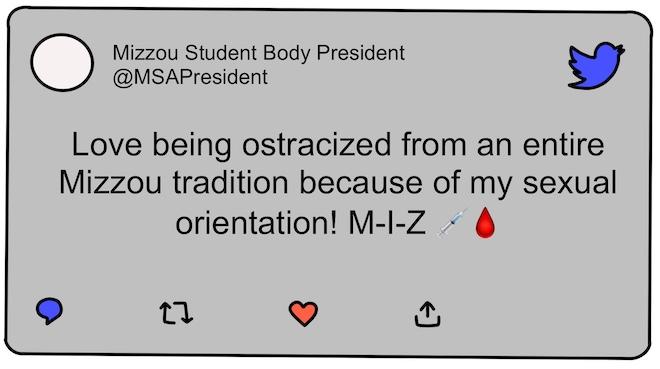
Bobby Lee is a freshman journalism major at MU. He writes for The Maneater about political affairs, MU, the state of journalism and environmental topics.
During the start of the college academic year, hundreds of universities begin their homecoming celebrations. Many universities, including MU, create a competition within a blood drive between different organizations like Greek organizations. The tradition is an easy way to get the student body together to do some good in the community and across the country. Yet, one group of students faces discrimination every year when it comes to this practice: “men who have sex with men (MSM),” according to official terminology used by the Food and Drug Administration.
According to FDA regulations, MSM have typically been denied from donating if they had sex with a man in the past 12 months due to the stigma from the HIV and AIDS epidemic, which began in the 1980s. Due to a lack of blood supply during the COVID-19 pandemic, the federal requirements went down to a three-month deferral period. However, research shows any ban of MSM donating makes no scientific sense.
Blood drive organizers test all samples of blood thoroughly for various diseases including HIV, Hepatitis C, syphilis and much more. The testing is so thorough that removing the lifetime ban of “men who have sex with men” had no statistically significant change in transmission through blood donations. The consensus is MSM can and should safely donate blood.
During the AIDS and HIV epidemic, MSM were quickly barred from donating blood due to them being at a higher risk for transmitting the disease.
However, this ignores how any sexuality and gender could carry the disease. Untrue stereotypes about gay men, however, made people view AIDS as a disease for the LGBTQ+ community. They believed gay men were more promiscous, less safe during sexual intercourse and not smart enough to take proactive steps to avoid the disease.
These assumptions, of course, gloss over the fact that having unsafe sex or multiple sexual partners is not exclusive to sexuality. However, the deeply entrenched stereotypes of the 1980s are still prevalent in modern medical regulations. Despite the fact blood drive organizers actively and thoroughly test for any disease in blood donations, the FDA has refused to terminate the homophobic regulation. Even the World Health Organization and Red Cross have pushed to have the FDA reverse the disastrous ban.
This issue touches deep at MU where the student body president, Landon Brickey, was refused from donating. In a tweet from his official account, he stated, “Love being ostracized from an entire Mizzou tradition because of my sexual orientation! M-I-Z.”
HIV and AIDS today, despite being treatable, are still a point of discrimination in many people’s lives. People carrying this disease are still ostracized by family, certain health care workers and the public. It is just as important to remember HIV and AIDS are not a person’s entire story; it is personal information that should not be weaponized by homophobic stereotypes. They likely did not ask to get the disease, and they deserve kindness and respect like everyone else.
Additionally, make sure to not fall into the outdated stereotypes of a generation ago that have led to a disastrous medical regulation.
It is clear the regulation and ban on MSM donating blood is unscientific, outdated and built on homophobic stereotypes of the community during the AIDS epidemic. The ban on donations should be reversed. Furthermore, society should do a better job educating people on AIDS and HIV. Everyone deserves respect, no matter their sexuality or medical history.
The Maneater recognizes that, while HIV/AIDS is not a major threat in America, that is not true around the world. We encourage all of our readers to donate to The Global Fund, an organization driving to end AIDS, Tuberculosis, and Malaria around the world to provide equitable health for all. https://www.theglobalfund.org/en/
Edited by Sarah Rubinstein | [email protected]